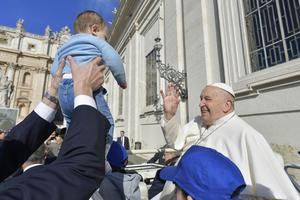A Child of Holy Saturday: Pope Emeritus Benedict XVI Turns 90
COMMENTARY

Easter Sunday brings the 90th birthday of Pope Emeritus Benedict XVI, who was born on Schulstraße 11 in Marktl am Inn, Germany, at 8:30 in the morning. It was Holy Saturday, making the future pontiff quite literally a child of the Triduum. Then-Cardinal Joseph Ratzinger wrote of the importance of being born on Holy Saturday in his 1998 memoir, Milestones:
“I have always been filled with thanksgiving for having had my life immersed in this way in the Easter mystery, since this could only be a sign of blessing. To be sure, it was not Easter Sunday but Holy Saturday, but, the more I reflect on it, the more this seems to be fitting for the nature of our human life: We are still awaiting Easter; we are still not standing in the full light, but walking toward it in full trust” (8).
Understandably, a great deal of focus has been paid over the years to the reflections, homilies and writings of Pope Benedict on Easter. But not only is there something deeply personal about Holy Saturday for Joseph Ratzinger the man, that day — when Our Lord was behind the massive stone at the entrance of the tomb, in utter darkness, his broken body stretched upon cold and unforgiving rock — brings essential hope to the Christian confronting the challenges of the modern age. That is a truth that Joseph Ratzinger has spent decades trying to impart.
In 1969, then-Father Ratzinger, an increasingly famous theology professor, delivered a series of radio addresses on the Church that were eventually published by Ignatius Press in 2009 under the title Faith and the Future. The final address prophesied a very dark future for Christians in which the Church, he said, “will be poor and will become the Church of the destitute ... but when all the suffering is past, a great power will emerge from a more spiritual and simple Church.”
Far less known in that same year were his three Holy Saturday reflections that capture the same sense of hope for humanity, even in the face of a century of darkness and despair.
In his first meditation, Father Ratzinger wrote:
“The divine darkness of this day, of this century, which is increasingly becoming one long Holy Saturday, is speaking to our conscience. It is one of our concerns. But in spite of it all, it holds something of comfort for us. The death of God in Jesus Christ is at the same time the expression of his radical solidarity with us. The most obscure mystery of the faith is at the same time the clearest sign of a hope without end. And what is more: Only through the failure of Holy Friday, only through the silence of death of Holy Saturday, were the disciples able to be led to an understanding of all that Jesus truly was and all that his message truly meant. God had to die for them so that he could truly live in them.”
Some 40 years later, in May 2010, Pope Benedict made a pastoral journey to Turin, Italy. The pontiff was still pondering Holy Saturday, and he used his visit to meditate upon the Holy Shroud and its meaning for modern humanity, so lost in loneliness and despair.
“The concealment of God,” Pope Benedict said in Turin, “is part of contemporary man’s spirituality, in an existential almost subconscious manner, like a void in the heart that has continued to grow larger and larger. … After the two world wars, the lagers and the gulags, Hiroshima and Nagasaki, our epoch has become increasingly a Holy Saturday: This day’s darkness challenges all who are wondering about life, and it challenges us believers in particular.”
In Turin, too, before the shroud, the pope and theologian reflected on another of the Church’s teachings on Holy Saturday that is perpetually relevant to the human condition: the descent of Our Lord into hell.
“In this ‘time-beyond-time,’ Jesus Christ ‘descended to the dead.’ What do these words mean? They mean that God, having made himself man, reached the point of entering man’s most extreme and absolute solitude, where not a ray of love enters, where total abandonment reigns without any word of comfort: ‘hell.’ Jesus Christ, by remaining in death, passed beyond the door of this ultimate solitude to lead us, too, to cross it with him. We have all, at some point, felt the frightening sensation of abandonment, and that is what we fear most about death, just as when we were children we were afraid to be alone in the dark and could only be reassured by the presence of a person who loved us. Well, this is exactly what happened on Holy Saturday: The voice of God resounded in the realm of death. The unimaginable occurred: Namely, Love penetrated ‘hell.’ Even in the extreme darkness of the most absolute human loneliness, we may hear a voice that calls us and find a hand that takes ours and leads us out. Human beings live because they are loved and can love; and if love even penetrated the realm of death, then life also even reached there. In the hour of supreme solitude, we shall never be alone: Passio Christi. Passio hominis.”
A child born on Holy Saturday has been shaped by the mystery of that sacred day for 90 years.
Like all of us, he is still not standing in that full light of Easter; but unlike so many of us, he truly does walk toward it in full trust.
Happy birthday, Pope Emeritus Benedict! Ad multos annos!
- Keywords:
- benedict xvi
- matthew bunson

















